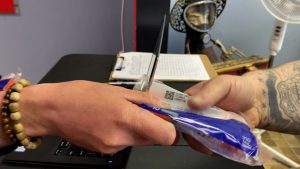The Supreme Court on Tuesday lifted a temporary hold on Sen. Lindsey Graham’s testimony in a Georgia investigation of possible illegal interference in the 2020 election by then-President Donald Trump and his allies in the state.
The court left no legal impediments in the way of Graham’s appearance before a special grand jury, now scheduled for Nov. 17.
But in an unsigned order, the justices noted that Graham still could raise objections to some questions.
The South Carolina senator, a top Trump ally, had argued that a provision of the Constitution, the speech and debate clause, shields him from being forced to testify.
Graham was first subpoenaed in July by Fulton County District Attorney Fani Willis, who opened her probe shortly after a now-infamous January 2021 phone call where Trump asked Georgia Secretary of State Brad Raffensperger to “find” the votes needed to overturn his loss to Democrat Joe Biden.
Willis had told the justices that “the delay resulting from a stay would be unavoidably harmful” to the grand jury investigation.
Lower courts had rebuffed Graham’s plea for a pause while the legal case plays out.
Tuesday’s order dissolved a temporary hold that Justice Clarence Thomas had placed on the testimony while he and his colleagues weighed the arguments.
Willis wants to question Graham about two phone calls he made to Raffensperger and his staff in the weeks after the election.
During those calls, Graham asked about “reexamining certain absentee ballots cast in Georgia in order to explore the possibility of a more favorable outcome for former President Donald Trump,” Willis wrote in a petition seeking to compel his testimony.
Graham also “made reference to allegations of widespread voter fraud in the November 2020 election in Georgia, consistent with public statements made by known affiliates of the Trump Campaign,” she wrote. She said in a hearing last month that Graham may be able to provide insight into the extent of any coordinated efforts to influence the results.
Raffensperger said he took Graham’s question about absentee ballots as a suggestion to toss out legally cast votes. Graham has dismissed that interpretation as “ridiculous.” Graham has also argued that the call was protected because he was asking questions to inform his decisions on voting to certify the 2020 election and future legislation.




